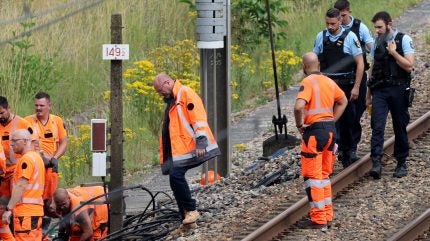
The French high-speed rail network is usually the envy of its European neighbours, but ahead of perhaps its biggest ever test – the Paris 2024 Olympics – it was hit by an apparent arson attack, causing chaos across the network.
What happened?
Overnight on 25 July, the night before the Games kicked off, a series of fires were set on the high-speed line infrastructure.
These were quickly identified as arson, and a criminal investigation was launched alongside emergency repair works.
The fires were set on trackside cable infrastructure on four lines, but only three were “successful”: The Atlantic, North and East lines. A further fire was intended to disrupt the southern line to the Alps-Maritimes region, but it did not cause the same damage.
But services to and from Paris and cities including Brest, Bordeaux, Nantes, Lille and Strasbourg were severely disrupted.
Passenger services across France were delayed and cancelled, with international services to the UK, Germany and Belgium also disrupted.
Is it fixed?
France’s national rail infrastructure manager and provider SNCF said on Monday morning it expected all three damaged lines to be back to normal service.
“Thanks to the exceptional efforts of SNCF Network staff, who worked non-stop since Friday morning, repairs are now fully completed on all the high-speed rail services affected by the sabotage attacks. Tests have been conclusive and the train lines are now able to function as normal,” it said in a statement.
French Interior Minister Gerald Darmanin said the effect of the arson was not to disrupt the Games directly and caused more nuisance to the many thousands of French city-dwellers who traditionally spend most of August on holiday in the rural parts of the nation.
The senior government minister said the investigation had produced results by Sunday 28 July, and he was confident the national police would identify a suspect from “certain elements.”
Whodunnit?
Although French authorities have not said – officially – who they suspect is responsible for the attack, French media is full of briefings from “sources” in the internal security forces on Monday.
Darmanin seemed to confirm reports that far-left extremists were behind the attack, after describing the arson as “deliberate, very precise, extremely well-targeted”. “This is the traditional type of action of the ultra left,” he said.
A 28-year-old man has been arrested in connection with the fires and was questioned in Rouen, in Normandy, by gendarmes.
He was found with keys to technical premises (thought to be connected to the TGV network) pliers, a set of universal keys and texts “linked to the ultra-left”.
The fires were seemingly well-organised, because they targeted signalling infrastructure in key locations, close to branch line junctions, thereby affecting as many train services as possible.



